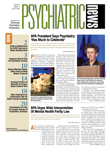With funding from a lawsuit settlement, the program “Prescribing for Better Outcomes” (PBO) is using the pharmaceutical industry's marketing tactics to promote information about the use of antiepileptic drugs for bipolar and mood disorders that is free of funding and other involvement from the industry.
The PBO program was developed by several researchers at the Cecil G. Sheps Center for Health Services Research at the University of North Carolina at Chapel Hill. The program's principal investigator, Cathy Melvin, Ph.D., M.P.H., presented their countermarketing efforts to promote balanced and accurate drug information about off-label use of antiepileptic drugs last month at the same time as APA's 2009 annual meeting in San Francisco.
The program is funded by a grant derived from a lawsuit settlement between a consortium of state attorneys general and Pfizer regarding the illegal marketing of Neurontin (gabapentin) for unapproved uses. In 2004 Parke-Davis, a subsidiary of Warner-Lambert (which was acquired by Pfizer), pleaded guilty to felony charges and agreed to pay $450 million. A portion of the settlement was designated to fund a “corrective educational campaign” to provide “fair and balanced information” about gabapentin and other antiepileptic drugs. The Sheps researchers were given the grant to develop a promotional campaign to educate prescribers, including psychiatrists, about the evidence for using antiepileptics in treating mood disorders.
The content of this campaign was based on an exhaustive, 700-page drug-class review of antiepileptic drugs in bipolar disorder, neuropathic pain, and fibromyalgia developed by experts at the Oregon Health and Science University with updated literature searches. The drug-class review was commissioned by several state Medicaid agencies. The PBO investigators adapted portions of the review into concise, clear, messages for wide dissemination.
However, counteracting the effects of the Warner-Lambert promotional messages that had previously penetrated the market was no easy feat, Melvin told the audience at the presentation. In 2003, the year before the lawsuit settlement, 90 percent of all gabapentin prescriptions written in the United States were for off-label indications, ranging from bipolar disorder to back pain, although gabapentin has been approved by the FDA for only the adjunctive treatment of seizures and pain from shingles.
In a literature search, the PBO researchers found 29 published studies of gabapentin for bipolar disorder in which only four were randomized trials and two were crossover trials. The rest were open-label, uncontrolled trials, case reports or series, chart reviews, and letters. However, 429 articles in 152 journals cited these 29 trials more than 1,000 times in the medical literature, and many of these articles' authors had ties with the pharmaceutical industry. “This echo chamber was created,” Melvin noted, along with other marketing tactics to push the unproven uses of gabapentin into the minds of prescribers.
“We learned from the best,” said Melvin. The PBO program borrowed a page from the manual of pharmaceutical marketing, including direct mailing, medical-journal advertisements, continuing medical education, professional meetings and educational programs, and free gifts.
The PBO program staff published a supplement to the March 2008 Journal of Psychiatric Practice about the program and have been distributing free copies of the supplement at medical meetings such as APA's annual meeting. The PBO Web site posted an educational module containing the clinical evidence on antiepileptic drugs in treating bipolar disorder, including the drugs that have shown efficacy and the drugs that have not. This online module qualifies for one hour of accredited continuing medical education.
In addition, the PBO staff conducted focus-group research to test the effectiveness of their key messages with psychiatrists and psychiatry residents. The messages were printed on pocket guides and stored on memory sticks, which were given to physicians and other prescribers like the logo pens, mugs, and key chains handed out by pharmaceutical sales representatives. Further, PBO staff took out advertisements in widely read psychiatric journals and newspapers, including Psychiatric News, to promote the program Web site.
Melvin told the audience that one of the main challenges for the program was to find consulting physicians for PBO's science and dissemination panels who met the stringent conflict-of-interest rules established by the attorneys general. Anyone who received payments above $100 from Pfizer or a drug company that manufactures a competing product with gabapentin for either on-label or off-label use from 2002 onward was disqualified from the PBO project.
“Psychiatrists are the most heavily marketed-to physician group in the country,” said Melvin.
It took the staff months to find conflict-free experts to participate in the PBO program.
This type of educational program requires a long-term financial commitment of resources that are clearly separated from the industry. The grant for the PBO program amounted to $3.2 million over four years and runs out this month. So far staff have not found additional nonindustry funding to keep the program going and to continue to update the drug information, despite interest expressed by the federal Agency for Healthcare Research and Quality and other organizations, Melvin told Psychiatric News.
Detailed information about the “Prescribing for Better Outcomes” program and educational materials are posted at<www.prescribingforbetteroutcomes.org>. The complete review of antiepileptic drugs is posted at<www.ohsu.edu/ohsuedu/research/policycenter/customcf/derp/product/AED_Final_Report_Update%201.pdf>.▪
